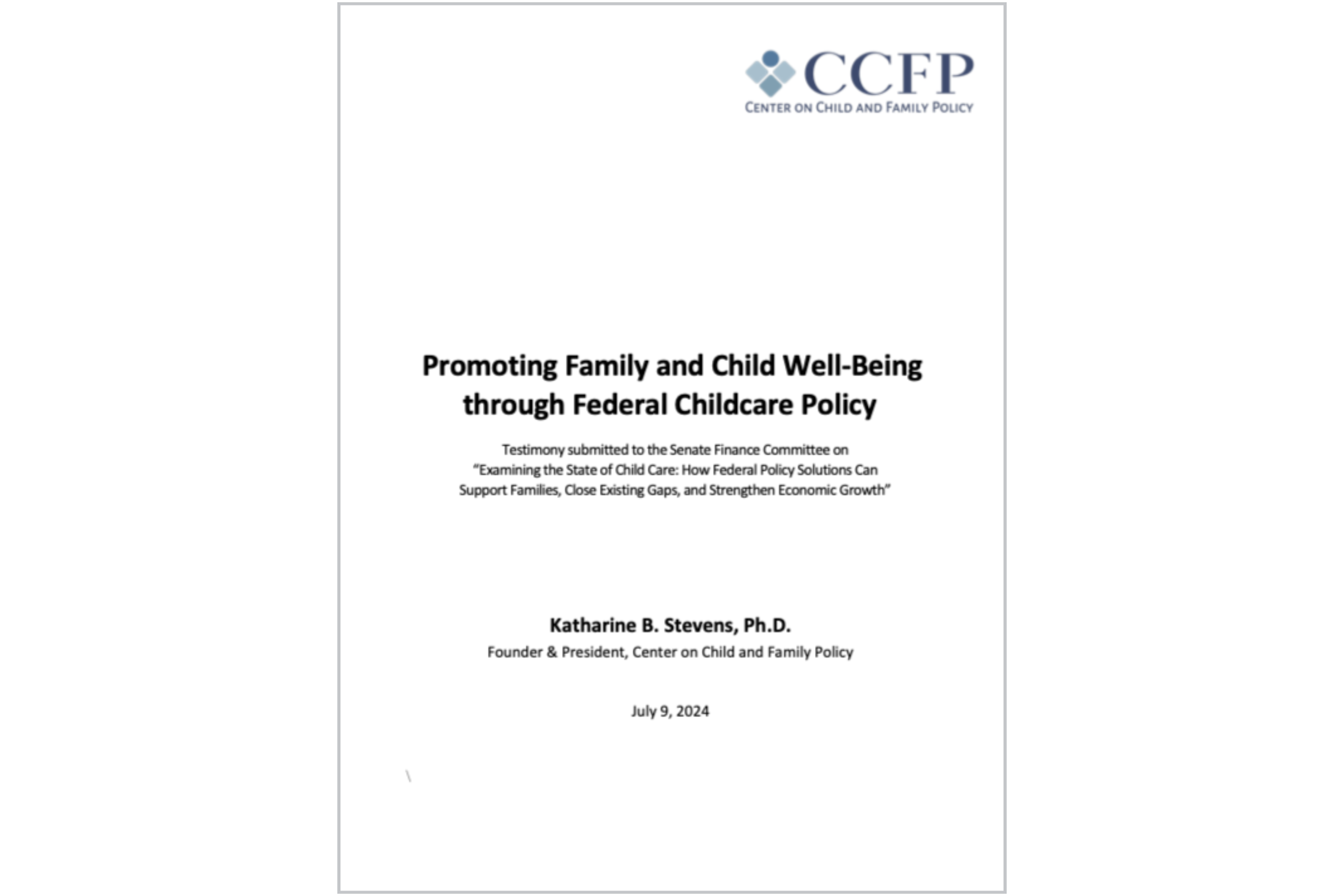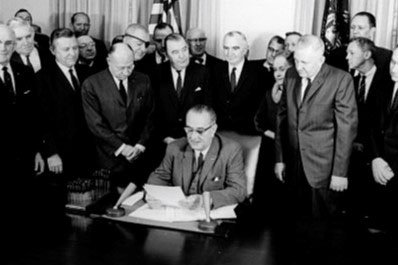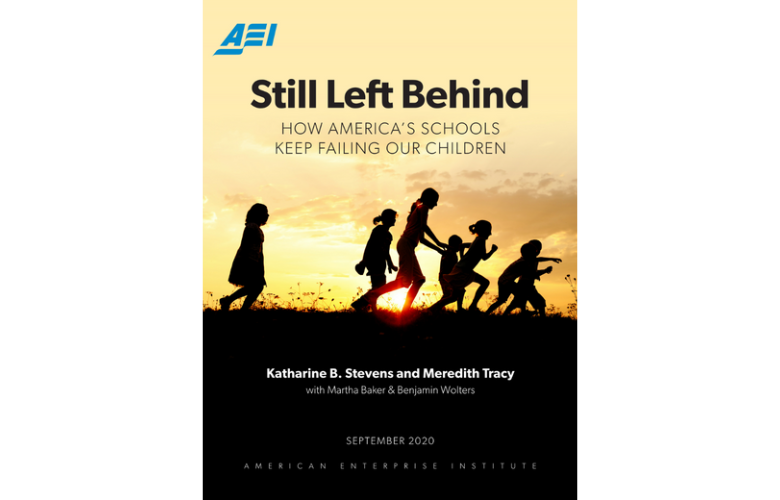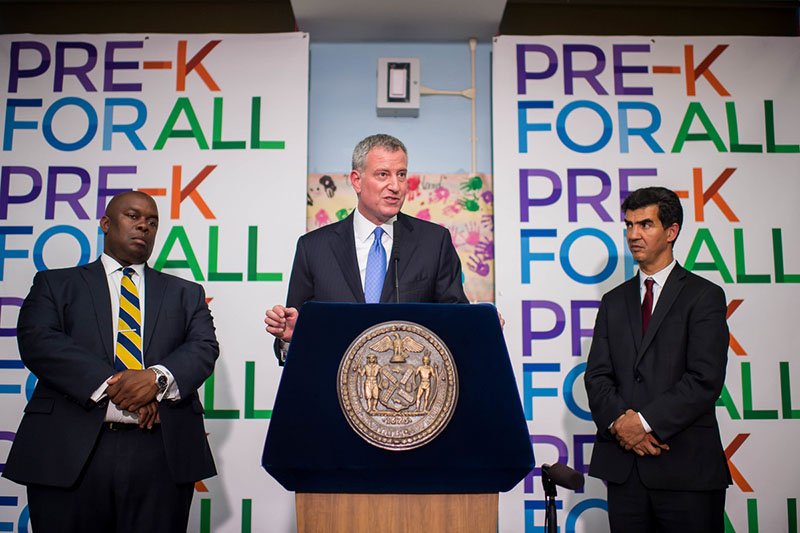All Work
Early Childhood Education
Responses to “Questions for the Record” Following My Senate Finance Committee Testimony
Following her testimony at the Senate Finance Committee’s hearing on “Examining the State of Child Care,” Katharine Stevens answered Senators’ questions on four key childcare policy topics.
Promoting Family and Child Well-Being through Federal Childcare Policy
Federal policymakers should aim to: 1) Boost choice for low-income parents. 2) Shore up family childcare. 3) Break down bureaucratic silos to amplify impact of current funding. 4) Leverage a broader range of federal funds. 5) Promote state leadership in early care and education.
Taking Stock of a Half-Century of Failed Education Reform
Our excessive focus on schooling — rather than the non-school environments that most powerfully shape children’s lives — continues to hurt the very children we are trying so hard to help.
Still Left Behind: How America’s Schools Keep Failing Our Children
One-third of lower-income eighth graders still fail to demonstrate even minimal competence in reading and math, and wide achievement gaps persist in every state, despite decades of ever-intensifying school reform and steadily increased spending,
Expanding New Mexico State Pre-K Would Be A Costly Mistake
A state-funded New Mexico study reports “statistically significant” improvements in children’s outcomes, which in real life are essentially meaningless.
Why Expanding New Mexico State Pre-K Won't Help the Children Who Need Help the Most
New Mexico’s Legislative Finance Committee (LFC) recently concluded that “prekindergarten remains a cost-effective way to improve student outcomes.” But the data they present cites does not support that conclusion.
Why Michigan Should Spend New Federal Funds on High-Quality Childcare — Not Universal Pre-K
What Detroit desperately lacks isn’t school for 4-year-olds. What it lacks is high-quality child care for the city’s youngest, most vulnerable children.
A Federal Performance Partnership for Early Childhood
States increasingly recognize childcare’s critical impact on children’s early learning and development. Yet to support growing state efforts to provide low-income working families with adequate access to high-quality care, we must fix dysfunctional and fragmented federal funding streams.
Expanding Pre-K Will Do Little for Children
Tacking additional grades onto a poorly performing school system won’t help the children who need help the most. Improving the 13 grades they already attend could help them a lot.
Promoting State Leadership: A Federal Strategy for Advancing High-Quality Care and Education for Young Children
We must find new ways to promote and leverage growing state commitment to early childhood, to incentivize state innovation, and to highlight strategies and activities of currently leading states.
The Good and Bad in Virginia’s 2016 School Readiness Report Card
Done right, high-quality early childhood programs can help to level the playing field for disadvantaged kids before they enter school. But no program can inoculate children to the damaging effects of poor-quality education down the line.
Does ‘Issue 44’ Help Poor Kids?
It’s hard to see how funneling a little more money into a badly underperforming, inefficient system will result in the “high quality” schools promised by Issue 44 promoters.
The Promise of Pay for Success
Pay for Success can’t solve every social challenge alone. But it holds great promise as a bipartisan approach to build more effective, efficient and responsive government programs.
Pay for Success: A New Approach to Funding Social Welfare Programs
Four national experts explain the Pay for Success model, an innovative new approach to public financing that improves social programs’ effectiveness and advances evidence-based policymaking.
Pay for Preschool Success
Recent critiques of Utah’s pioneering Pay for Success project in fact underscore a key strength of the Pay for Success approach: bringing rigor and transparency to public sector spending, which usually has neither.
Pay For What Works
An innovative public financing approach known as Pay For Success provides a way to break the cycle of ineffective government spending on social programs.
Too Little, Too Late
Minnesota’s fascinating preschool battle drags on, highlighting crucial questions for the expansion of early education across the country.
The Next Front in the Preschool Fight
Minnesota’s unusual debate highlights three crucial questions that the growing early care and education sector is increasingly going to face as more initiatives get off the ground across the country.
Bigger Isn’t Better for New York City Pre-K
While adding tens of thousands of pre-K slots in a matter of months makes for good headlines, it does not make for good pre-K.
What the Midterm Elections Mean for Pre-K
For pre-K, the outcomes of the governors’ races will make much more of a difference than who controls the US Senate.





















